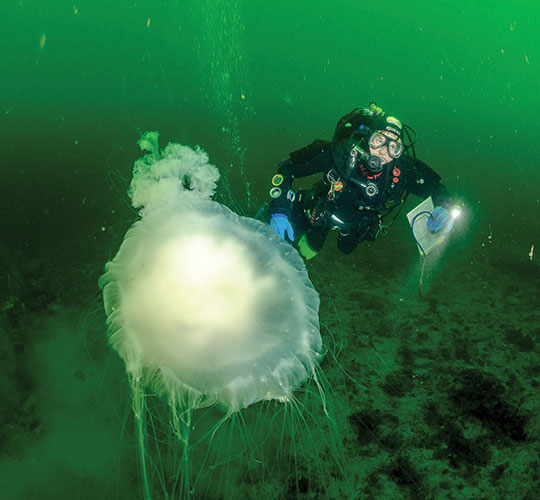Divers + Science = Citizen Science
By Heather Creech

Don Gordon carries a special slate on every dive. On that slate is a list of 100 species of fish, invertebrates, and marine plants for the Pacific Northwest waters. While diving with his friends, he checks off what he sees – a single sighting, a few examples, an abundant population. Afterwards he uploads his data to an online system managed by the Reef Environmental Education Foundation (REEF – www.reef.org), an international marine science organization. His observations are then merged with tens of thousands of other surveys coming in from dive sites around the world.
Don is a citizen scientist – a volunteer contributing to the collection and review of data to inform scientists about the state of our ecosystems. Based on his observations, and those of sport divers working with marine science organizations in nearly every region of the world, scientists have been able to mine growing databases for trends in ecosystem health, species migration due to changing habitats and ocean temperatures, impacts of commercial activities on population declines, and the value of marine protected areas (MPAs) for recovery.
A case on point: ReefLife Survey (reeflifesurvey.com) works with volunteer divers to collect data on MPAs around the world. In mining that data, scientists have shown that the beneficial outcomes of conservation increase exponentially when the MPAs are large – greater than 40 square miles (100km2) – and have well enforced no-take rules, among other features. These important findings, published in the journal Nature in 2014, would not have been possible without the massive amounts of data systematically collected by citizen scientists.
This trend to working with volunteers is driven by two factors: the need to scale up data collection and the availability of online and mobile technologies that allow individuals to upload data quickly and easily. There simply aren’t enough scientists to collect the data necessary to understand the changes taking place in our environment. The technology makes it possible to crowdsource photos, videos, marine life counts, and other observations from every diver, snorkeler, and shore walker who wants to make a difference.
Questions are often raised about the reliability of citizen science data, so Stefania Gorgopa, MSc graduate of the University of Victoria, set out to compare volunteer divers’ data collection with that of professional scientific divers. She found that, without question, recreational divers have equivalent data precision to that of scientists. Local knowledge of a dive site, species identification training, and diving skill influence the reliability of citizen science divers – but with those, the data collected by volunteers is as reliable as that collected by scientific divers.
I asked Don why he took the time to collect data on his dives, and he spoke at length about how documenting the marine life has enhanced his dive experience beyond measure – he has become more observant and more appreciative of what he sees around him; and he has become much more knowledgeable, having learned his species identification in order to report what he sees with greater accuracy.
But this isn’t just about his personal enjoyment. Don also notes the growing need to understand the role of marine ecosystems in global environmental health, and how much harder it is to get marine observations compared to land-based studies of plants and animals. In addition to being able to identify the local marine life (and we all know how hard it can be just to tell one rockfish from another), volunteer divers need a level of competence including buoyancy control, managing currents and low visibility conditions, and, in more advanced expeditions, handling transect lines, cameras, and other monitoring gear. The more advanced the support needed, the more limited the pool of volunteers becomes. More divers with both skill and knowledge are needed to support scientific inquiry.
Don volunteers for REEF and Ocean Wise (formerly Vancouver Aquarium), but there are hundreds of other opportunities out there for divers at all levels of certification to enrich their dive experience and make a difference. Over the coming issues of DIVER, I will be reporting on global and regional initiatives that want to involve recreational divers in freshwater and marine science. If you already volunteer as a citizen scientist or know about an initiative you want to share with DIVER readers, let me know!
Heather Creech is a citizen scientist with ReefWatch South Australia and a freelance writer, dividing her time between Victoria, BC, and Adelaide, South Australia.
One Response to “Divers + Science = Citizen Science”
Leave a Comment








Sara Leggatt
Very interesting article; thank goodness for volunteers above and below the ocean!